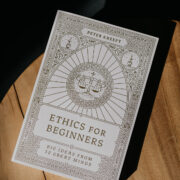The following article is sourced from the forthcoming “Suffering,” Spring 2023, issue XV of Evangelization & Culture, the Word on Fire Institute’s quarterly print journal. To learn more and receive your own print issues, start your membership here.
The biblical book by Qoheleth (or Ecclesiastes, if you prefer the Greek form of his name) was probably written about 250 BC, a relatively bland period of Israel’s history. Unlike the prophets, who claimed to transmit oracles from God, Qoheleth encourages us to use our brains and to find out the truth for ourselves. There is no shortcut to wisdom. We have to pay our dues and earn it: by living, by struggling with life’s ambiguities, by allowing reality’s overarching meaning slowly to impress itself on our hearts. Questions are Qoheleth’s gift to us, not answers; we are encouraged to find the answers for ourselves. He is not going to hand us wisdom on a platter. Even the form of the book proclaims this message; reality is surveyed from different angles, and distinct avenues for reflection are indicated. Bombs are dropped. No definitive thesis is propounded. As we trudge through life we have slowly to arrive at our own conclusions.
The opening verse of the book is well-known and serves as its leitmotif: “Vanity of vanities; all is vanity.” The words are clear enough, but what do they mean? The Hebrew term hevel, usually translated as “vanity,” occurs thirty-eight times in the book and means “vapor” or “breath,” but it carries connotations of contingency, impermanence, unreliability, lack of substance, and inability to satisfy the longings of the heart. It is further explained by a phrase that has divided commentators since the time of St. Jerome: Absolutely everything is “vexation of spirit,” a source of annoyance. Or is it a “feeding on the wind”: ultimately unsustaining? Or is it “chasing after the wind”: radical frustration?
Is Qoheleth saying that nothing matters and, therefore, (according to one translation) everything is meaningless? No. As becomes clearer as the book proceeds, what he is saying is that nothing in this world of space and time can claim to be absolute. We live in a world of permanent change; everything that is real at this moment is real, but it has only relative value. It is temporary. Who knows what tomorrow will bring? The insubstantial character of whatever is accessible to sense or to ordinary human experience seems to indicate that there is something beyond the here-and-now that is of greater significance than anything in our passing universe. Yes, everything within our sphere is mere vapor compared with what is beyond our limited experience. Strangely, it is what is invisible to us that gives meaning and a degree of permanence to everything that is visible.
Mixity means that dark days will end and a season of gladness will dawn.
Not many readers notice the frequent mentions of God in the pages of Qoheleth’s book. Yet there are thirty-seven uses of the word for God in the book’s twelve chapters—to say nothing about the pronouns that extend the scope of these references. His fundamental assertion about God is simple: “God is in heaven, and you upon earth” (5:2). From this assertion of divine transcendence he concludes that God is Creator and Sustainer of everything that exists (12:1). God is the giver and controller of all: “The righteous and the wise and their deeds are in the hand of God” (9:1). Mere humans are not able to understand the order God establishes, but their conduct will come under the scrutiny of divine judgment. “I said in my heart, God will judge the righteous and the wicked, for he has appointed a time for every matter, and for every work” (3:17).
Since what happens on earth is controlled from above, we are not in a position to comprehend the full meaning of events. “[God] has made everything suitable for its time . . . yet they cannot find out what God has done from the beginning to the end” (3:11). The dawning of wisdom coincides with the realization that our grasp of universal meaning is limited and our desire for control is delusional. The world dances to the tune that God sets; our preferences are irrelevant. Life becomes more serene when we are content to join the cosmic chorus rather than attempting to impose our will on the world around us and then wondering why we feel frustrated.
“Just as you do not know how the breath comes to the bones in the mother’s womb, so you do not know the work of God, who makes everything” (11:5).
We live in an era in which many suffer because of an inherent sense of entitlement, seeing themselves as the center of the universe and aggrieved because neither the universe nor other people recognize their primacy. We are beset by individualism, as Pope Francis frequently asserts. We are unable to make room for others. Instead of companionship we experience competition. The inevitable overlap of individual ambitions leads to conflict. What begins as complaint soon evolves into anger, and anger into aggression. Instead of finding strength in solidarity, other people (and especially those who are different) are demonized and quickly become targets for our preemptive strikes. We continue drifting away from reality until eventually it seems like our enemy. And our unhappiness increases.

The lesson we learn from Qoheleth is that although everything in this world of space and time comes from God, each of its qualities is balanced by its opposite. We live in a world characterized by mixity. Our experience of human existence reveals a wide variety of elements, not all of which sit together comfortably and some of which seem diametrically opposed. Such is life. “For everything there is a season, and a time for every matter under heaven: a time to be born, and a time to die,” as the well-known passage begins (3:1). Mixity means that some things delight us and others seem hostile. Sometimes dealing with this chiaroscuro reality brings us joy, and other times it fills us with gloom and foreboding. If we expect this alternation, then we are less upset by it. If, on the other hand, we demand that everything concord with our settled preferences, then we will be disappointed at least half the time.
The fact is that hard times are a reality in everyone’s life: death, bereavement, diminution, illness, conflict, disappointment, puzzlement—to name a few examples. To use a favorite term of Qoheleth, such experiences are part of our “portion.” We don’t have to be stoical in the face of suffering or to deny its reality. When we suffer we suffer. But there is no need to add mental confusion to our pain. Nor can we expect to find definitive answers as to why our lives sometimes turn sour. We live in a world of mixity. There is no way we can block the onward march of the different seasons of life. Struggle and ease, loss and gain, sorrow and joy all have a role to play in the growth of wisdom and the formation of character. If we are becoming wise, we will accept the inevitability of such vicissitudes and learn to make the most of what each season has to offer—while insulating ourselves against its potential damage.
Above all we have to come to the point of shrugging off our attitude of resentment that things do not always happen in accordance with our preferences; there is a higher plan at work in our lives. Qoheleth does not use the word “providence,” but the idea is central to his thought. All that comes from the hand of God is good, whether we like it or not, whether we understand it or not. Reality is sacred. Any alternative is delusional. Sometimes, like Job, we have to endure massive reversals of fortune and the whole world seems bleak. Add physical pain to this and our horizons shrink further. “The days of darkness will be many” (11:8). In such a grim situation, our hope needs to ground itself on the recognition that all things are subject to the law of hevel: nothing under the sun lasts forever. A time of relief and rejoicing will eventually return.
The thought of the impermanence of created realities is a comfort in times of suffering, especially in the context of a solid belief in the prospect of eternal life. But this is not the only lesson that Qoheleth offers us. Mixity means that dark days will end and a season of gladness will dawn. Qoheleth is clear that the best preparation for coping with hard times is to enjoy the moments of happiness that life offers. He may well be the only biblical author who recommends merriment! “So I commend enjoyment, for there is nothing better for people under the sun than to eat, and drink, and enjoy themselves, for this will go with them in their toil through the days of life that God gives them under the sun” (8:15). Even our toil can be a source of gratification. “So I saw that there is nothing better than that all should enjoy their work, for that is their lot” (3:22).
Go, eat your bread with enjoyment, and drink your wine with a merry heart; for God has long ago approved what you do. Let your garments always be white; do not let oil be lacking on your head. Enjoy life with the wife whom you love, all the days of your vain life that are given you under the sun. (9:7–9)

The capacity to enjoy life’s benefits and to cope with its challenges depends on our willingness to live in the present, to take the present moment seriously. It is, after all, the only moment we have. First, this means finding a means of reducing the tyranny of nostalgia, which rewrites our personal history with the sole aim of devaluing the present. The belief that somehow the summers of our youth were sunnier than those we experience today will undermine any appreciation of what is at hand and set us on the path of unrelenting grievance. Likewise, allowing ourselves to be shrouded by an ill-defined sense of future disaster will infect everything with fear and anxiety. To live in the present does not mean abandoning cherished memories or prudent preparation for the future; it means seeing reality clear-sightedly, not only protecting against its dangers but allowing ourselves to find pleasure in its opportunities.
This is the theme of carpe diem made famous in the film Dead Poets Society: an attitude of making the most of the possibilities that present themselves. Reality is constantly on the move; for us to profit from it we have to be somewhat athletic. The English poet Robert Herrick expressed this urgency when he wrote: “Gather ye rosebuds while ye may, / Old Time is still a-flying; / And this same flower that smiles today / Tomorrow will be dying.” We should not allow ourselves to become distracted by the past or future. Rather, we should make the effort to be totally engaged with the narrow band of reality that alone is open to our influencing, to play our role in the drama of the universe instead of sitting sulkily on the sidelines.
If our faith is strong enough to accept that—in some way beyond our immediate comprehension—this moment is a gift of God’s love, then our whole outlook on life will begin to be transformed. Instead of being puzzled and exasperated with our changing fortunes, progressively we will be drawn into wonderment at the manifold ways in which God intervenes in our life and in our world. Taking a step back from our immediate reactions to the world around us will allow us to expand our horizons, and, perhaps, life will begin to make more sense.
Mixity can also be viewed as an expression of the overarching relevance of the Paschal Mystery. Life comes about by death. Fulfillment is the fruit of self-forgetfulness. Humility is the road to exaltation. We love our enemies and forgive those who trespass against us, and we seek to serve rather than to dominate. It is all very counter-cultural, but, somehow, choosing an opposite is the way to a more abundant liveliness. Mixity offers us the ongoing opportunity of making this life-giving choice. We choose to die so that we may arise to eternal life.
